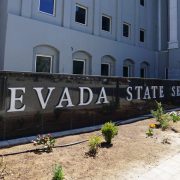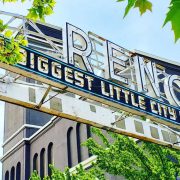PLAN believes everyone has the right to live in a clean and healthy environment, regardless of their race, income or immigration status. Addressing our dependence as a nation, and especially in Nevada, on an extractive economy, is central to our Environmental Justice campaign.
Currently, poor and marginalized communities are disproportionately affected by pollution and climate change, while dirty fossil fuel and mining corporations rake in millions in profits. This leads to Black, Indigenous, and People of Color (BIPOC) in Nevada developing asthma and other respiratory illnesses including COVID at higher rates.
Southern Nevada is known to have immensely high temperatures during the summer and now increasingly throughout the year. We cannot continue seeing day after day the level of heat that was present just a number of weeks ago. Something has to change; our elders, youth, outside workers and Nevadans with preexisting conditions can become and are vulnerable to these levels of heat.
Our environmental justice concerns transcend the urban-rural divide. The pillaging of lands by industrial mineral extraction corporations goes against our nations treaties. Mineral extraction practices also devastate water resources by releasing toxins into it and by decreasing the amount of our precious water resources that we all depend on. Nevada fails to capture the wealth produced by mining due to a tax system written by and for the mining industry, so when mines leave what is left is a legacy of toxic pit lakes, broken treaties, underfunded state social services, disruption of vegetation and natural water systems that our Indigenous and rural communities need along with wildlife.
Nevadans are already feeling the impacts of the fragile environment and of corporations who put their profit first. Community planning across the state needs to happen, but with consultation from impacted areas, not just of experts and leaders. People with lived experiences are best equipped to find solutions that benefit their community.
Green technology is also something that our industry leaders should implement, but it again should be done with directly impacted people at the forefront. Public ownership of these technologies, the control of infrastructure and revenue, is necessary to solve the climate crisis. It should not be an opportunity to create bigger profits for the wealthy.
We can no longer allow for resource extraction companies to leave the state with sizable profits and leaving our lands irreparably changed and scarred. Corporations land recovery efforts are not enough when we are talking about whole community’s water being polluted and sacred sites destroyed. And to what extent? This can not be the objective that the state of Nevada has in being a national leader on combating climate change. Nevada is not a piggy-bank for corporations to take from. It’s time for them to stop just taking and actually invest in the state.
The aforementioned areas of the environment are also areas of public health. We must recognize that the scope of the environmental movement has been too narrow and that other areas such as housing and economic rights are also very much intertwined in environmental justice. All of this must be taken in consideration in the Nevada State Climate Initiative.







